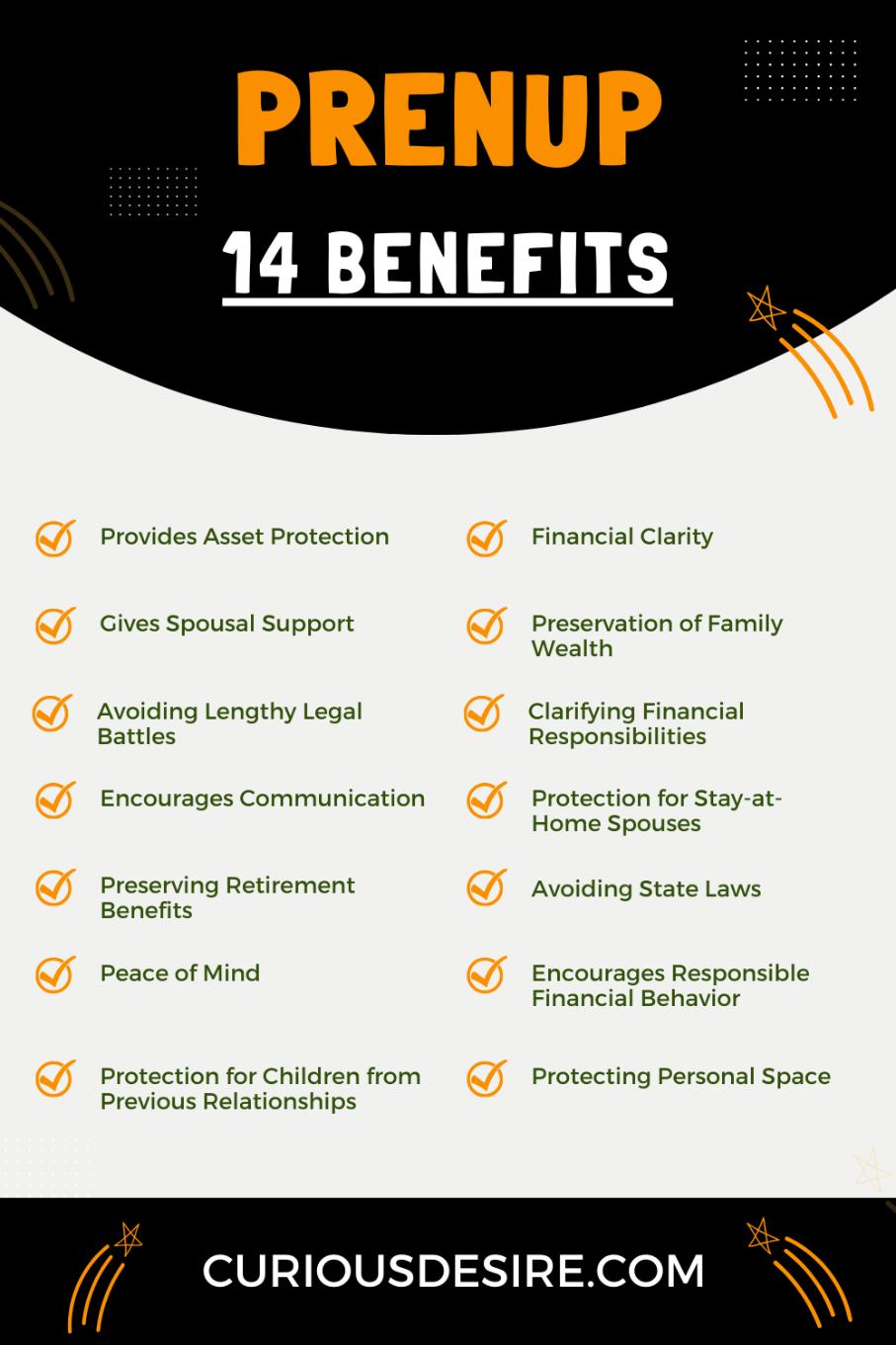Marriage is more than just love; it brings challenges, especially when money becomes an issue. Often, small fights over irresponsibility can lead to regrets and even divorces.
That’s why discussing money matters before marriage with a prenup makes sense. It might seem awkward, but it helps settle potential troubles down the road.
In this discussion, we’ll explore the benefits of a prenup, showing how this upfront talk about money can make married life smoother.
Here are the top 5 benefits of prenup:
- Financial Clarity
- Preservation of Family Wealth
- Protection for Stay-at-Home Spouses
- Avoiding State Laws
- Protection for Children from Previous Relationships
[toc]

Benefit 1: Asset Protection
A prenuptial agreement acts as a shield for the assets you bring into a marriage. According to Hello Prenups, a prenup assures that you won’t be held responsible for your partner’s debts, making sure your assets remain yours.
For example, if you have a business or investments, the prenup can state that they’re still exclusively yours in case of a divorce.
This protective measure becomes particularly valuable when one person enters the marriage with more substantial financial resources or property.
Benefit 2: Financial Clarity
Prenuptial agreements work like a roadmap for handling finances in a marriage, giving couples a clear understanding of each other’s financial expectations and responsibilities, as highlighted in a study.
These agreements lay out the nitty-gritty details, such as who covers what expenses and how bills and savings will be managed.
The goal? Making sure everyone is on the same page about money, which, in turn, reduces the likelihood of fights over finances down the road.
Benefit 3: Spousal Support
If a marriage ends, a prenup can decide in advance how much support one person might need from the other.
This becomes particularly significant when there is a notable income disparity between the spouses.
The prenup can set the amount and for how long someone might get support. It keeps things fair and avoids arguments about money after the marriage ends.
Benefit 4: Preservation of Family Wealth
Individuals with significant family wealth can utilize a prenuptial agreement to ensure its preservation within the family.
Therefore this agreement holds particular importance if you’re entering a relationship with inherited properties, as highlighted by Greens Solicitors.
The prenup can clearly say that certain things, like family businesses or big inheritances, won’t be shared or divided if there’s a divorce.
It’s like a way to make sure those special things stay with the family and don’t get mixed up during tough times.
Benefit 5: Avoiding Lengthy Legal Battles
When there’s no prenup, divorces can be a real headache, dragging on and becoming complicated.
But if you have a prenup, things get simpler because it already says who gets what. The Clark Law Firm points out that this speeds up the whole process, making it less stressful for everyone involved.
This isn’t just about saving time; it’s also about saving money on legal fees.
With a prenup, you don’t have to argue about who gets which piece of the pie because it’s already laid out. This not only makes the divorce quicker but also smoother,
Benefit 6: Clarifying Financial Responsibilities
Prenups aren’t only for major things; they can also sort out everyday money matters, such as who covers the cost of groceries or rent.
Including these details in the prenup is like having a plan for how the couple will deal with their everyday expenses.
This way, there are fewer arguments about who should do what with the money, making it easier for the couple to manage their daily spending without constant disagreements.
It’s kind of like having a map that guides the couple in handling their regular expenses without any confusion or hassle.
Benefit 7: Encourages Communication
Creating a prenup involves having an open conversation about money.
While there’s a common misconception that discussing financial matters beforehand is a red flag in a relationship, it’s quite the opposite.
Discussing a prenuptial agreement can provide an excellent opportunity to discover each other’s expectations, dreams, and hopes, as noted by Family Law in Partnership.
Moreover, It provides couples with the opportunity to talk about what matters to them and how they want to manage their finances.
This not only deepens their understanding of each other but also helps in building trust.
Benefit 8: Protection for Stay-at-Home Spouses
If one person in the marriage decides to stay home and take care of the family, a prenup can ensure that they are financially supported if the marriage doesn’t work out.
It establishes a plan for supporting the partner who sacrificed career opportunities to contribute to the family.
This ensures that both partners are taken care of, even if they have different roles in the marriage.
Benefit 9: Protection for Children from Previous Relationships
If someone has kids from a previous relationship, a prenup can make sure they’re taken care of financially (source).
It can decide things like child support or education expenses.
This helps protect the financial well-being of the children, even if the couple ends up getting divorced.
Benefit 10: Preserving Pension and Retirement Benefits
For couples who have invested in retirement savings, a prenup lays out the plan for handling these funds in the event of a breakup.
Numerous studies recommend protecting your retirement fund through a prenup.
Since retirement money is crucial, the prenup specifies who gets what, preventing arguments about splitting these savings in a divorce.
This clear plan makes the process easier and reduces possible conflicts over retirement money.
Benefit 11: Avoiding State Laws
Every state has different rules about divorce.
With a prenup, couples can make their own rules. They can decide how things will be split, instead of following the state’s default laws.
It gives couples more control over their situation and helps them create a plan that works for them.
Benefit 12: Peace of Mind
Having a prenup is like having a backup plan. If something happens, both partners know what to expect.
It provides a sense of security and comfort, knowing that financial matters are already sorted out.
This peace of mind makes it easier for couples to focus on building a life together without worrying about what might happen if things don’t work out.
Benefit 13: Encourages Responsible Financial Behavior
A prenup helps couples make smart decisions about their money together.
It’s not just about cash—it’s like creating a solid plan for money in the marriage that gives a sense of responsibility.
By talking openly and planning about money, couples set up a system that helps them understand each other, work together, and share responsibilities.
This doesn’t just make money matters easier; it also makes their overall connection stronger, ensuring a better financial journey together.
Benefit 14: Protecting Personal Space
A prenup can set rules for keeping personal financial space within the marriage.
It’s like saying, “You handle your money, and I’ll handle mine.”
This way, both partners keep control over their finances while sharing other responsibilities in the marriage.
Prenup Benefits FAQs
1. Who benefits the most from a prenup?
Prenuptial agreements can benefit individuals with significant assets or those entering a marriage with uneven financial situations.
They provide a legal framework for protecting assets, defining spousal support, and clarifying financial expectations in the event of a divorce.
2. What does a prenup protect you from?
A prenup protects individuals from financial disputes in a divorce. It outlines how assets, debts, and spousal support will be handled, providing clarity on property division and inheritance rights.
3. Why would a couple want a prenup?
Couples may want a prenup to clarify financial expectations, protect individual assets, define spousal support terms, and avoid potential conflicts in the event of a divorce. It can serve as a tool for financial planning and transparency.
4. Why men should get a prenup?
Men, like women, may choose to get a prenup to protect their financial interests, especially if they have significant assets before marriage.
It is a personal decision based on individual financial circumstances.
5. Is it bad if my boyfriend wants a prenup?
No, it is not inherently bad. Different individuals have various reasons for wanting a prenup, and it’s crucial to have open and honest communication about the motivations behind it.
Understanding each other’s perspectives can lead to a healthier relationship.
6. Is it insulting to get a prenup?
While some people may find it insulting, it depends on the communication and context.
Discussing the reasons behind wanting a prenup and ensuring both partners are comfortable with the agreement can help navigate any potential concerns.
7. Can you put cheating in a prenup?
While some couples include infidelity clauses in their prenups, the enforceability of such clauses varies by jurisdiction.
It’s essential to consult with legal professionals to determine the validity of such provisions.
8. Is a prenup a red flag?
Not necessarily. A prenup is a personal choice, and many couples use it as a tool for financial transparency and planning.
It becomes a concern only if there’s a lack of communication or trust in the relationship.
9. Does a prenup mean he doesn’t love you?
No, a prenup is a legal document focused on financial matters. It does not necessarily reflect the emotional aspects of a relationship.
Open communication about the reasons behind the prenup can help address any concerns.
10. Should I ask my girlfriend for a prenup?
If you believe a prenup is essential for your financial planning or if you have concerns, it’s a conversation worth having.
Approach the discussion with sensitivity and openness to ensure both partners are on the same page.
11. How do you tell your partner you don’t want a prenup?
Express your feelings honestly and openly, emphasizing your commitment to the relationship.
Be prepared to discuss and address any concerns your partner may have, fostering a healthy and understanding dialogue.
12. Why do people not like prenups?
Some people may view prenups as unromantic or distrustful. There might be societal stigma, and some may feel uncomfortable discussing potential issues that could arise in a divorce.
13. Why do I feel sad about a prenup?
Feelings about a prenup can be complex and may be linked to societal expectations, fear of the unknown, or concerns about the future.
Open communication with your partner or a counselor can help address these feelings.
14. Should I be offended if my husband wants a prenup?
Instead of being offended, try to understand the reasons behind the request.
It’s an opportunity for an open and honest conversation about financial expectations and concerns, promoting mutual understanding.
15. Can a prenup ruin a relationship?
It depends on how the discussion is handled. Open communication, transparency, and understanding of each other’s perspectives can prevent a prenup from negatively impacting a relationship.
16. Does a prenup increase the risk of divorce?
Research does not definitively support the idea that prenups increase the risk of divorce. The success of a marriage depends on various factors beyond the existence of a prenup.
17. Are couples with prenups more likely to divorce?
There is no conclusive evidence that having a prenup directly correlates with an increased likelihood of divorce.
Many factors contribute to the success or failure of a marriage.
18. How many successful marriages have prenups?
The success of a marriage is influenced by numerous factors, and having a prenup does not determine success or failure. Many successful marriages involve prenuptial agreements.
19. What is the highest risk of divorce?
Various factors can contribute to a higher risk of divorce, such as lack of communication, infidelity, and financial issues.
It’s essential to address and work on these issues to build a healthy relationship.
20. Do most married couples have a prenup?
No, most married couples do not have prenuptial agreements.
Prenups are more common in certain situations, such as when one or both partners have significant assets or there’s a significant income disparity.

